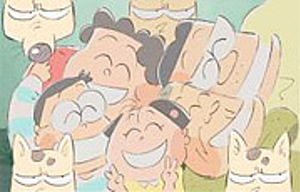Review
My Neighbors the Yamadas
| Review: | ||||||||
While the rest of New York City was singing Konya Wa Hurricane a few days ago, the faithful of us got in line at Museum of Modern Art on 53rd Street between 5th and 6th avenues to see the collective work of our God-figures, Hayao Miyazaki and Isao Takahata, better known as Studio Ghibli. I had my ticket, and was all set to get in on Thursday when the crew announced that due to the weather, they, along with the rest of Manhattan, would be shutting down at 2 PM. While paper-pushers all over the city grinned as they got a half-day off, those of us that had come for the North American premiere of My Neighbor the Yamadas grimaced, lugging our dead bodies plus eight pounds of water that had blown past our umbrellas back to wherever we came from.
Today was a different matter entirely. After being treated to theatrical subtitled presentations of Porco Rosso (which went over very well), Grave of the Fireflies (not a dry eye in the house, despite a subtitling job that was so bad, they mixed up dialogue between Setsuko and the aunt), and a rare presentation of On Your Mark, we finally got to see the newest Ghibli film, seen for the first time outside of Japan. My Neighbors the Yamadas stuck out like a sore thumb in the company of past Ghibli works, but standing on its own, it works quite well. The Yamadas are a fairly normal Japanese family... There's husband and wife Takashi and Matsuko, kids Noboru and Nonoko, and grandma Shige, as well as Pochi the Dog. In the style of the newspaper comic by Hisaichi Ishi, the film is presented as a series of ongoing vignettes, some of which continue for a while, while others are short and self-contained. Most of them are quite charming, and all offer the same insight into the characters as the best comic strips do. A typical scenario involved the family coming back from a trip to the mall, only to discover that they've left daughter, doe-eyed Nonoko, behind! Nonoko comes to the conclusion that every single member of her family has gone astray. While she's keeping her cool and helping out a smaller child that lost his mother, the rest of the family is going insane trying to figure out where she could be. Another incident involves Grandma Shige trying to stare down a motorcycle gang. There's also Mr. Yamada's flight of fancy as the Masked Rider, and the day Mrs. Yamada put too much ginger in the miso soup, throwing the whole family into a total short-term memory breakdown. Yamadas is the first Ghibli feature to make liberal use of computers for the animation process, and in this one, new techniques were invented to make each piece of art water-color drawn, something that would have been impossible with traditional animation techniques. Several items are obviously rendered and rotoscoped (although never losing that ink-sketched look), and while the final product probably wasn't worth the insane production costs and delays, it is visually striking and quite unique, especially when matched with the wit of a newspaper comic strip and the optimistic Takahata sense of humor that was saw glimpses of in Pom Poko. The result is somewhere between My Neighbor Totoro and the collective works of animator Bill Plympton. While the subtle (and sometimes not-so-subtle) commentary about family life in Japan is a real breath of fresh air in terms of humor and satire in anime, the entire look and concept of Yamadas makes it sadly unmarketable to the mainstream media market of any country. Yamadas disappointed in the Japanese box office (they're hoping to make back some amount of money from video sales), and many Ghibli fans came away disappointed with the minimalist art style and lack of a contiguous story. While most of the complainers are obviously missing the forest for the trees, it's easy to see their point. And while Takahata may have drawn out his fantasy a bit longer than was necessary (like in Pom Poko), the real reward are the same deep characters that we get from only the best comic strips in America. The wacky sense of nostalgia with which the film approaches childhood and family bickering brought back memories of Bill Watterson's timeless "Calvin & Hobbes" strip... In my mind, there are certainly worse things to dredge up. Shochiku Films/Studio Ghibli  |
||||||||
| Grade: | |||
|
Overall (sub) : A-
+ Fantastic animation, and upbeat funnies-style humor ⚠ Nothing objectionable |
|||
| Production Info: | ||
|
Full encyclopedia details about |
||
